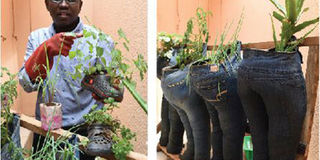Giving backyard farming a new look

Nyanzi of Prof Bio Research adds glamour to urban farming by using old jeans. Photo by Ismael Kezaala
What you need to know:
- Hey ladies, don’t throw away those jeans after use, the latest farming trends dictate they are equally vital in agribusiness. Denis Bbosa sounded out agribusiness expert and innovator Julius Nyanzi and he divulged the means, through which you can plant in jeans and after three or more months, sit on the dining table and enjoy your sweat without the hustle and cost of visiting a market.
Strange and astonishing as it may look, a farmer can put soil in used jeans, irrigate and then yield vegetables and herbs in the comfort of his home.
According to entrepreneur scientist Julius Nyanzi, 27, the founder of Prof Bio Research Company, the craze of farming in jeans is fast spreading in urban centres thus eliminating the myth of limited land.
“Most people in township areas claim they don’t have enough land for farming but this jean technology can even be done by a breastfeeding mother in a rented house,” he says.
Nyanzi says any farmer interested in backyard or green house farming can also use toilet paper rolls, align them in a tray form, insert mixed soils and grow leafy vegetables.
To Nyanzi, although the city cannot provide for itself, that can change by the way people think of farming.
How it works
“Women have many waste clothes which they can recycle and use in growing vegetables. In a country like Netherlands, green house farming in Jeans is on a high,” says Nyanzi.
After getting the used jeans, Nyanzi fills them with fertile organic compost soil.
He advises one to mix top soil with ashes from chicken bones (because they are rich in nitrates and potassium), bicarbonate of soda (a thickening agent that kills off any bacteria) and then mix with clay soil.
The combination is then filled in a pair of jeans and put somewhere where sunlight is available. He recommends mixing 100g of soda, one wheelbarrow of chicken ash, one wheelbarrow of clay and two wheelbarrows of top soil to get the required standard soil for production.
This farming technology is ideal for leafy vegetables like spinach, sukuma wiki and ginger that improve the family diet as well as herbs like aloe vera and stevia.
Why jeans
Nyanzi, a bachelor’s of science graduate from Makerere University, says jeans are reusable and can last more than 20 years.
The denim absorbs water and allows good air circulation unlike other clothing materials like polyester and khaki.
Interestingly, it is the women jeans that work best, ‘because they have that bum space’.
The crop expert adds that farming in jeans eliminates the weeding process, allows fast plant growth and avoids external factors like bacteria.
Huge benefits
First and foremost, the farmer operates in a small space, has good monitoring of his garden, he is sure of the produce quality and does not require too many chemicals.
“This farming technology inspires children to see farming as a viable option and initiates them into farming. Urban farming is also the first step toward commercial farming,” he says.
He advises farmers to use harvested water and selected waste water.
“Waste water should be put in sunlight for a day to dissolve chemicals. They should also use detergent water because it has phosphates and oils that decompose and add fertility to soil.”
Start-up capital
For Shs50,000, a tenant, you can enter the privileged class of modern farmers.
Nyanzi says many people are embracing the low cost venture because for the aforesaid little start-up capital.
This technology suits most plants with a three to six-month lifespan which translates to quick gains.
Yet there is the exponential benefit of earning from agri-tourism as many people are willing to pay to tour these backyard gardens and learn first-hand.
Many prospective farmers are learning from successful farmers.
Farming seminar due
Nyanzi is working on plans to expand his ideology further as he exploits agribusiness opportunities cropping up in the city.
Using his 10-year teaching experience, Nyanzi has organised a learning seminar on November 1 dubbed the ‘Great Sundowner.’
“With other renowned experts, we shall teach farmers how to make seedlings, how to plant stevia and they will all get free seedlings after,” Nyanzi promised.
Right
Urban farming is a response to a variety of pressures. Large parts of the developing world are facing shortages of water and arable land.
Governments and other sponsors have supported urban food-growing projects in Cuba, Colombia, Botswana and Egypt. In the developed world, small-scale urban farms are seen as an antidote to industrialised agriculture’s excesses, including chemical fertilisers that pollute waterways and the high costs of transporting food to urban markets.
Source: FAO




